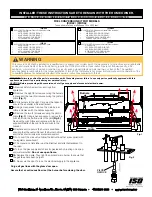
20
7060-227J
August
13,
2018
Explorer III Wood Stove
Fire Risk.
Disposal of Ashes
• Ashes should be placed in metal container
with tight fitting lid.
• Do not place metal container on combustible
surface.
• Ashes should be retained in closed container
until all cinders have thoroughly cooled.
WARNING
3. Disposal of Ashes
• Frequency:
When ash is within 1-3/4 in. (44mm) of
firebox lip
• By:
Homeowner
Ashes should be placed in a metal container with a tight
fitting lid. The closed container of ashes should be placed
on a non-combustible floor or on the ground, well away
from all combustible materials, pending final disposal. If the
ashes are disposed of by burial in soil or otherwise locally
dispersed, they should be retained in the closed container
until all cinders have thoroughly cooled.
4. Glass Cleaning
• Frequency:
As desired
• By:
Homeowner
Clean glass with a non-abrasive glass cleaner. Abrasive
cleaners may scratch and cause glass to crack.
If the
deposits on the glass are not very heavy, normal glass
cleaners work well. Heavier deposits may be removed by
using a damp cloth dipped in wood ashes or by using a
commercially available oven cleaner.
After using an oven cleaner, it is advisable to remove any
residue with a glass cleaner or soap and water. Oven
cleaner left on during the next firing can permanently stain
the glass and damage the finish on metal surfaces.
A portion of the combustion air entering the firebox is
deflected down over the inside of the door glass. This
air flow “washes” the glass, helping to keep smoke from
adhering to its surface.
When operated at a low burn rate, less air will be flowing
over the glass and the smokey, relatively cool condition of a
low fire will cause the glass to become coated.
Operating the appliance with the Burn Rate Air Control and
Start-Up Air Control all the way open for 30-45 minutes
should remove the built up coating.
CAUTION
•
Do not use polishes with abrasives. It will scratch
surfaces.











































